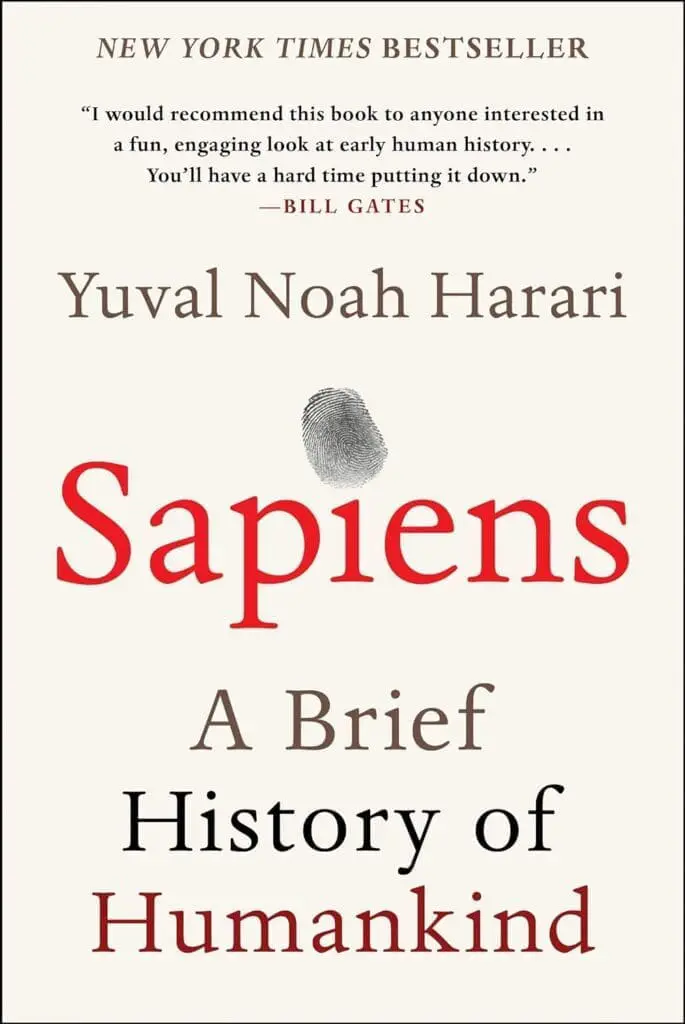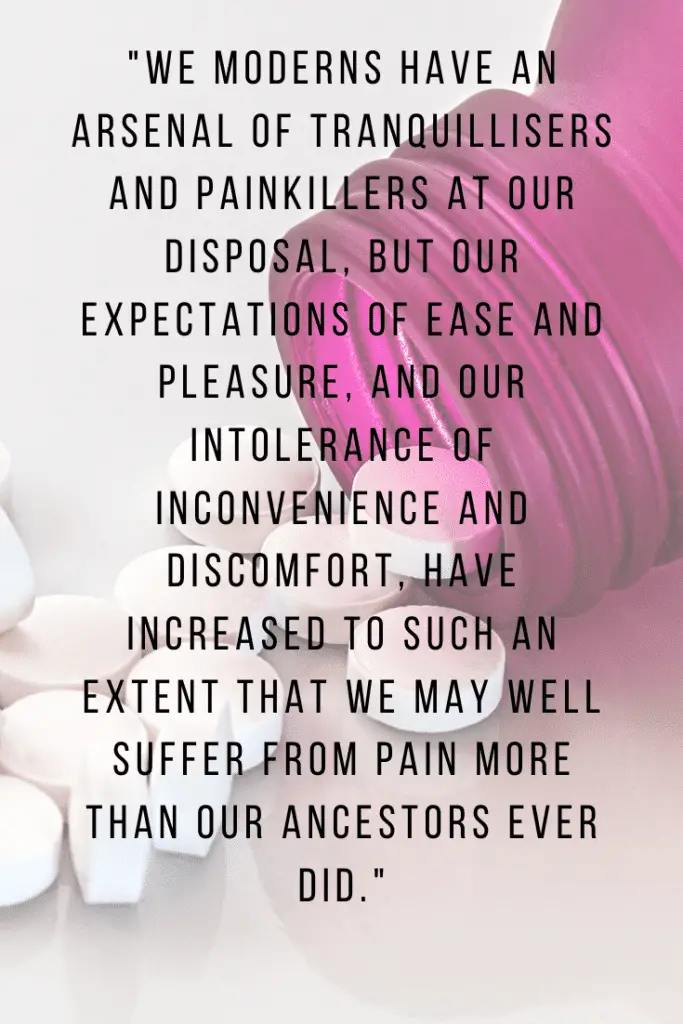Jump to Quotes
While Sapiens A Brief History of Humankind might not be everyone’s cup of tea, it is thought-provoking and well-researched. At times, depending on your religious beliefs, you might feel a little uncomfortable. Still, Harari notes this potential reaction, and it’s clear that he is not trying to change your beliefs or convert you to Buddhism or some other form of thought.
His goal is to inform and bring awareness to what have been the causes of human suffering and how human beings have learned to cope and find happiness or some state of peace in any given situation.
I actually came to enjoy Sapiens A Brief History of Humankind more and more, particularly when I reached Chapter 12: The Law of Religion. In this chapter, Yuval Noah Harari explores many of the world’s most prevalent religions and the role belief has played and continues to play in our lives and decisions.
Yuval Noah Harari’s discussions on “the nature of happiness” and the path to achieving inner peace are also particularly memorable. It seems so simple: don’t be afraid or run from any negative feelings of frustration, pain, anger, or anxiety. Learn to let them naturally flow in, and they will later flow out.
In the same way, don’t strive to extend the “good” and euphoric feelings but let those too pass through and onward in their due course.
In addition to Harari’s insights on human behavior and coping with life’s stressors throughout the ages, Sapiens A Brief History of Humankind also contains delightfully fun, sometimes surprising, historical nuggets.
For example, one of my favorite moments is in Chapter 14: The Discovery of Ignorance, when Harari discusses the origin and discovery of gunpowder along with its subsequent uses. To think, one minute, you’re just searching for an elixir to extend life, and you inadvertently discover a substance that is later used to end countless lives.
I do enjoy fireworks, though, so at least there’s that positive benefit.
Harari’s discussions in Chapter 5: History’s Biggest Fraud are highly relevant to the ongoing struggles of modern society, even though the roots of those struggles can be traced to the beginnings of human civilization.
Human beings seemed to be wired to always be on the hunt for more. In essence, luxuries eventually evolve into necessities, and the cycle perpetuates itself. As Harari succinctly puts it:
Towards the end of Sapiens A Brief History of Humankind, Harari sets his sights on the future of the human race, particularly in light of the advancements in science and medicine.
Will we one day find the “elixir of life” that those Daoist alchemists were searching for so many years ago? And what happens if we do? Who gets to sip immortality from that cup? What are the consequences?
We live in a world pretty much obsessed with wanting to be young and beautiful forever (I’m guilty too), but what happens if that day comes? How does it alter our lives?
On the surface, it might seem ideal. But, as Harari points out, just because a person could potentially live forever and preserve their youth doesn’t mean their bodies are immune from death by some outer cause–a car accident, for example, or getting caught in a shooting spree.
Would you want to continue living forever if you lost the love of your life? Or your child? Immortality and perpetual youth may not lead to the utopic world, you might think, and it might make us as individuals more isolated than ever due to fear.
8 Quotes from Sapiens a Brief History of Human Kind

This post may contain affiliate links. If you click them, I could earn a small commission at no cost to you. Thank you!
1.”He [Siddhartha Gautama] spent six years meditating on the essence, causes and cures for human anguish. In the end he came to the realisation that suffering is not caused by ill fortune, by social injustice, or by divine whims. Rather, suffering is caused by the behaviour patterns of one’s own mind.“
Sapiens A Brief History of Human Kind, Chapter 12: The Law of Religion
2. “The most important military invention in the history of China was gunpowder. Yet to the best of our knowledge, gunpowder was invented accidentally, by Daoist alchemists searching for the elixir of life. Gunpowder’s subsequent career is even more telling. One might have thought that the Daoist alchemists would have made China master of the world. In fact, the Chinese used the new compound mainly for firecrackers.“
Chapter 14: The Discovery of Ignorance
3. “The pursuit of an easier life resulted in much hardship, and not for the last time. It happens to us today. How many young college graduates have taken demanding jobs in high-powered firms, vowing that they will work hard to earn money that will enable them to retire and pursue their real interests when they are thirty-five? But by the time they reach that age, they have large mortgages, children to school, houses in the suburbs that necessitate at least two cars per family, and a sense that life is not worth living without really good wine and expensive holidays abroad.”
Chapter 5: History’s Biggest Fraud
4. “One of history’s few iron laws is that luxuries tend to become necessities and…spawn new obligations. Once people get used to a certain luxury, they take it for granted. Then they begin to count on it. Finally they reach a point where they can’t live without it.”
Chapter 5: History’s Biggest Fraud
(Been there. But the process is so subtle. Unless you’re on the watch for the luxuries turning into necessities, you oftentimes don’t realize it’s happening until the new lifestyle or material goods are so ingrained into your day-to-day that it’s difficult to imagine ever going back to the former way of life.)
5. “But the tiny minority able to afford the new treatments will not be euphoric either. They will have much to be anxious about. Although the new therapies could extend life and youth, they cannot revive corpses. How dreadful to think that I and my loved ones can live for ever, but only if we don’t get hit by a truck or blown to smithereens by a terrorist! Potentially a-mortal people are likely to grow averse to taking even the slightest risk, and the agony of losing a spouse, child or close friend will be unbearable.”
Chapter 19: And They Lived Happily Ever After

6. “Our values make all the difference to whether we see ourselves as ‘miserable slaves to a baby dictator’ or as ‘lovingly nurturing a new life’. As Nietzsche put it, if you have a why to live, you can bear almost any how. A meaningful life can be extremely satisfying even in the midst of hardship, whereas a meaningless life is a terrible ordeal no matter how comfortable it is.”
Chapter 19: And They Lived Happily Ever After

7. “We moderns have an arsenal of tranquillisers and painkillers at our disposal, but our expectations of ease and pleasure, and our intolerance of inconvenience and discomfort, have increased to such an extent that we may well suffer from pain more than our ancestors ever did.”
Chapter 19: And They Lived Happily Ever After
8. “There is poetic justice in the fact that a quarter of the world, and two of its seven continents, are named after a little-known Italian whose sole claim to fame is that he had the courage to say, We don’t know.”
Chapter 15: The Marriage of Science and Empire
Harari will be remembered in 100 years as the greatest thinker of our time. He’ll top lists that include Socrates, Descartes, Kant, Aristotle… And sadly, in another hundred years or so he will unwittingly fall into another category with the likes of Jesus, Mohammad, Buddha, and, of course, Joseph Smith.